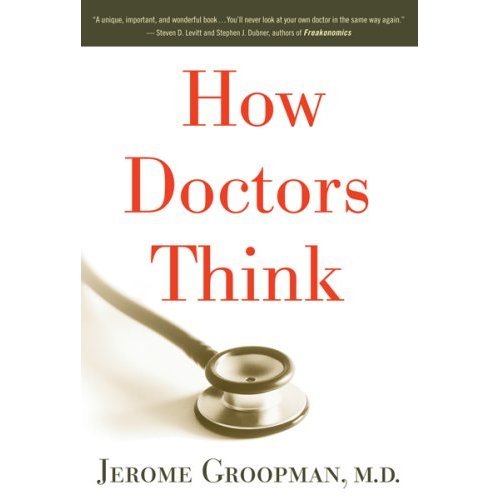Thursday, April 21, 2011
In the beginning...
Dr. Jerome Groopman's How Doctors Think was the first book that started me on my medical reading. I got it back in high school and read it early in college. This is a great book for both patients and people in the medical profession. Groopman, a frequent contributor to The New Yorker and author of several other books, offers a complete and thoughtful metacognitive analysis for doctors without being critical. He arms patients with the ability to tug at their physician’s thought processes and implores his fellow doctors to become aware of where their thinking goes wrong. I particularly enjoyed the chapter about the cardiologist from Ohio who was a Sherlock Holmes fan.
Friday, April 15, 2011
The American Fear of Literature
Sinclair Lewis' Nobel Prize speech from 1930.
http://nobelprize.org/nobel_prizes/literature/laureates/1930/lewis-lecture.html
Lewis was the first American to win the Nobel Prize.
"...in America most of us - not readers alone but even writers - are still afraid of any literature which is not a glorification of everything American, a glorification of our faults as well as our virtues."
http://nobelprize.org/nobel_prizes/literature/laureates/1930/lewis-lecture.html
Lewis was the first American to win the Nobel Prize.
"...in America most of us - not readers alone but even writers - are still afraid of any literature which is not a glorification of everything American, a glorification of our faults as well as our virtues."
Thursday, April 14, 2011
Secret Origin
Sometime in the middle of my college years, I looked at my collection of books and noticed a few that were related to medicine, the field I had decided to pursue (I a student in a dual-degree BS/MD program). I decided it would be practical to read these books and find more medically-related fiction and non-fiction if I had any spare time, especially the works of physician writers. Over time, I had quite a few under my belt and I decided to keep track of these titles for myself and to share with others who might be interested. It was one of my high school English teacher's that suggested I convert the list into blog form.
The idea and name for The Physician’s Library actually comes from Sinclair Lewis’ Arrowsmith. One of Martin Arrowsmith’s childhood heroes is an inarticulate and shabby but scientifically inclined physician named Doc Vickerson who tells young Martin: “Physician’s library just three books: ‘Gray’s Anatomy’ and Bible and Shakespeare."
Naturally, I hope to have my library be quite a bit larger than Vickerson's. However, one of the interesting things I found about his list is that only one of the three books is a scientific text. Although they are important, I believe that scientific texts alone do not make for a full medical education. After starting medical school, this is a theme I have run into over and over again. As you will see in many of the books on this list, medical science is a tangent to another aspect of medicine presented (e.g. medical cognition, medical error, social justice, etc.). Reading these books can prompt a reader to consider these often overlooked aspects. While there is obvious relevance to physicians and medical students, I hope that non-medical people will find these titles interesting as well.
Since the title of this blog comes from Arrowsmith, I think it makes sense that I list it first on this blog:
Arrowsmith
By Sinclair Lewis
This was actually the first of Lewis' books I have ever read and it has enticed me to read more of his books (I got Arrowsmith and a few others where I get most of my books - at a library booksale) and more about him. One of my future posts will probably include his Nobel prize speech which criticizes the American literary establishment at the time.
As for Dr. Martin Arrowsmith, I found many of his experiences in college/medical school a little too close to home. I identified much with Arrowsmith, who was intellectually drawn to medicine and frustrated with those who were allured to the prestige and financial stability of medicine. It's amazing how some things never change.
Probably one of my favorite parts of the novel is the Scientist's Prayer:
"God give me unclouded eyes and freedom from haste. God give me a quiet and relentless anger against all pretense and all pretentious work and all work left slack and unfinished. God give me a restlessness whereby I may neither sleep nor accept praise till my observed results equal my calculated results or in pious glee I discover my error. God give me strength not to trust God!"
Subscribe to:
Posts (Atom)

